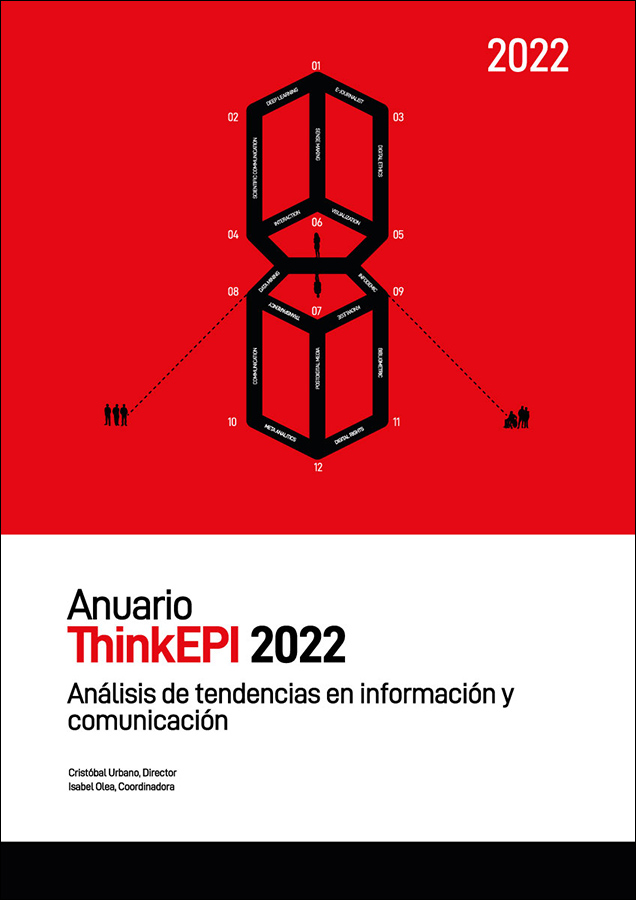Open access indicators: sources and tools
DOI:
https://doi.org/10.3145/thinkepi.2022.e16a18Keywords:
Open access, Crossref, Indicators, Monitoring, Repositories, UnpaywallAbstract
Determining the percentage of open access publications available is the most pragmatic indicator for measuring the concreteness of open science policies and can be found in most plans in this field. This note offers a review of the literature published in the last decade about the evolution of open access to the scientific literature and the analysis of open access indicators developed in different countries. The results show that, when creating an open access indicator, it is necessary to make decisions regarding the collection of documents on which the calculation will be carried out, the tool that will be used to determine the availability of open access documents, the definition and typologies of open access being studied, the possible inclusion of additional sources of information, aspects related to timing, and the publication of the documentation necessary to guarantee the reproducibility of the indicator.
Downloads
References
Archambault, í‰ric; Amyot, Didier; Deschamps, Philippe; Nicol, Aurore; Provencher, Franí§oise; Rebout, Lise; Roberge, Guillaume (2014). Proportion of open access papers published in peer-reviewed journals at the European and world levels"”1996-2013. European Commision. https://science-metrix.com/sites/default/files/science-metrix/publications/d_1.8_sm_ec_dg-rtd_proportion_oa_1996-2013_v11p.pdf
Basson, Isabel; Simard, Marc-André; Ouangré, Zoé-Aubierge; Sugimoto, Cassidy R.; Larivií¨re, Vincent (2022). "The effect of data sources on the measurement of open access: A comparison of Dimensions and the Web of Science". PLoS one, v. 17, n. 3, e0265545. https://doi.org/10.1371/journal.pone.0265545
Bosman, Jeroen; Kramer, Bianca (2018). "Open access levels: a quantitative exploration using Web of Science and oaDOI data". PeerJ preprints, v. 6, e3520v1. https://doi.org/10.7287/peerj.preprints.3520v1
Else, Holly (2018). "How Unpaywall is transforming open science". Nature, v. 560, pp. 291-292. https://doi.org/10.1038/d41586-018-05968-3
European Commission (2021). Monitoring the open access policy of Horizon 2020. https://doi.org/10.2777/268348
Larivií¨re, Vincent; Sugimoto Cassidy R. (2018). "Do authors comply when funders enforce open access to research?". Nature, v. 562, n. 7728, pp. 483-486. https://doi.org/10.1038/d41586-018-07101-w
Martín-Martín, Alberto; Costas, Rodrigo; Van-Leeuwen, Thed; Delgado-López-Cózar, Emilio (2018). "Evidence of open access of scientific publications in Google Scholar: A large-scale analysis". Journal of informetrics, v. 12, n. 3, pp. 819-841. https://doi.org/10.1016/j.joi.2018.06.012
Martínez-Galindo, Francisco-Jesús; Rubio, Francisco; Fernández-Burguete, Sergio (2022). "Monitorización de los mandatos de acceso abierto a través de repositorios institucionales". Profesional de la información, v. 31, n. 2. https://doi.org/10.3145/epi.2022.mar.04
NORF (2021). National open research landscape report. http://bit.ly/NORFlandscape
Orr, Richard (2021). What is an OA license? https://support.unpaywall.org/support/solutions/articles/44002063718-what-is-an-oa-license-
Philipp, Tobias; Botz, Georg; Kita, Jean-Claude; Richards, Paul; Sí¤nger, Astrid; Siegert, Olaf; Reumaux, Mathilde (2021). Open access monitoring: Guidelines and recommendations for research organisations and funders. https://doi.org/10.5281/zenodo.4905553
Piwowar, Heather; Priem, Jason; Larivií¨re, Vincent; Alperin, Juan-Pablo; Matthias, Lisa; Norlander, Bree; Farley, Ashley; West, Jevin; Haustein, Stefanie (2018). "The state of OA: a large-scale analysis of the prevalence and impact of Open Access articles". PeerJ, v. 6, e4375. https://doi.org/10.7717/peerj.4375
Piwowar, Heather; Priem, Jason; Orr, Richard (2019). "The future of OA: A large-scale analysis projecting open access publication and readership". BioRxiv, 795310. https://doi.org/10.1101/795310
Rebiun (2019a). Recomendaciones sobre la monitorización del acceso abierto. Rebiun Línea 3. Grupo de repositorios. http://hdl.handle.net/20.500.11967/245
Rebiun (2019b). Medición del acceso abierto en las universidades españolas y el CSIC (2014-2018). Rebiun Línea 2. Grupo de acceso abierto. http://hdl.handle.net/20.500.11967/354
Robinson-Garcia, Nicolas; Costas, Rodrigo; Van-Leeuwen, Thed N. (2020). "Open Access uptake by universities worldwide". PeerJ, v. 8, e9410. http://doi.org/10.7717/peerj.9410
Rovira, Anna; Labastida, Ignasi (2019). "The open access observatory". Liber quarterly, v. 29, n. 1. http://doi.org/10.18352/lq.10295
Science-Metrix (2018). Analytical support for bibliometric indicators: Open access availability of scientific publications. https://www.science-metrix.com/sites/default/files/science-metrix/publications/science-metrix_open_access_availability_scientific_publications_report.pdf
Severin, Anna; Egger, Matthias; Eve, Martin-Paul; Hí¼rlimann, Daniel (2018). "Discipline-specific open access publishing practices and barriers to change: an evidence-based review". F1000Research, v. 7. https://doi.org/10.12688%2Ff1000research.17328.2
Suber, Peter (2008). "Gratis and libre open access". SPARC Open access newsletter, n. 124. https://dash.harvard.edu/bitstream/handle/1/4322580/suber_oagratis.html
Downloads
Published
How to Cite
Dimensions


